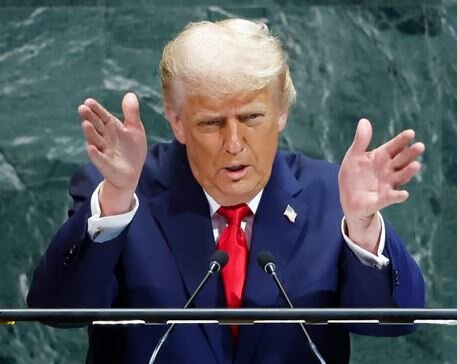West Asia according to Trump: Iran as the pivot of regional strategy

MADRID – In the pantheon of U.S. foreign policy, where doctrines bearing names such as Monroe or Truman are revered, the administration of Donald Trump attempted to forge a new one: a theology of power. Not a doctrine in the classical sense, a set of principles applicable to an external, objective world—but a pseudo-faith in which order and chaos depend on the singular will of the president.
The narrative he constructs is as simple as it is revealing. In his vision, West Asia was dominated for years by two “bullies”: Iraq and Iran. The fall of Baghdad in 2003, in his logic, did not create a power vacuum but removed one of the regional balancing poles, leaving Tehran as the “sole aggressor.” This simplification is crucial, because it translates a complex web of conflicts, national aspirations, and colonial legacies into a binary equation: peace is achieved by weakening Iran. Everything else—the Israeli-Palestinian conflict, intra-Arab rivalries, the rise of non-state actors, or the ambitions of middle powers such as Turkey or Saudi Arabia—is subordinated to this premise.
The defining moment of this theology, its trial by fire, came with the drone strike in January 2020 that killed General Qasem Soleimani, commander of the Quds Force of the Islamic Revolution Guard Corps (IRGC). Trump does not present it as just another episode in a long history of frictions, but as a turning point that “remade” the region. In his account, the action was not merely tactical but symbolic: a gesture of a power claiming the authority to judge regional stability. “We hit them back,” he asserts, convinced that a single extreme act of force was enough to restore balance. The operation thus takes on the character of a providential corrective: a secular intervention with a moral pretension, in which American violence is cloaked in redemptive legitimacy.
Yet this vision omits a reality perceived with clarity in Tehran: a country surrounded by U.S. military bases, armed rivals equipped with Western technology, and decades of sanctions, which has constructed its foreign policy on a logic of survival. Iranian influence does not stem from expansionism, but from defensive calculation. Its network of allies—from Hezbollah in Lebanon to the Ansarullah in Yemen—does not constitute an informal empire, but a containment belt against threats perceived as existential. In this context, the “strategic depth” Iran seeks is a rational response to an environment that for decades has regarded it as an anomaly to be corrected.
The U.S. withdrawal from the nuclear agreement (JCPOA) in 2018, driven by Trump, reinforced this sense of siege. By breaking a commitment Tehran had honored under international supervision, Washington sent the message that no pact with the West guarantees security. The consequence was immediate: the crystallization of a resistance ideology, integrated into contemporary Iranian political thought, which embraces technological, energy, and military self-sufficiency as both an expression of sovereignty and a structural response to international pressure.
Trump’s narrative, therefore, rests on a vicious cycle: Iran is punished under the pretext that it poses a threat, yet it is precisely sanctions, targeted killings, and unilateral designations as “terrorist” that reinforce Tehran’s well-founded perception of an existential threat. The outcome is predictable: a country that strengthens its defenses, approaches diplomacy wielded as an instrument of coercion with caution, and understands that deterrence—rather than asymmetric negotiation—is the only real guarantee of sovereignty. It is a loop perpetuated by Washington’s own rhetoric and its misunderstanding of the deep logic of Iranian security.
The Time interview also reveals how this theology of power projects onto the Israeli-Palestinian conflict. By highlighting his role in the Abraham Accords, which normalized relations between Israel and several Persian Gulf monarchies, Trump presents them as a proof of his effectiveness: isolating Iran supposedly allowed Arab alignment with Tel Aviv under American oversight. Yet this diplomatic success came at a cost: the marginalization of the Palestinian cause. Peace was reduced to an elite pact, sustained by economic interests and a common adversary.
By depoliticizing the conflict and subordinating it to an anti-Iranian logic, Washington helped bury—albeit temporarily—the prospect of a just solution. The war in Gaza, which erupted afterward, is a stark reminder that conflicts do not disappear by decree; they transform when denied resolution.
The underlying logic is deeply problematic. In Trump’s vision, peace is not built among equals but imposed from above. The U.S. presidency positions itself as a moral arbiter, deciding who is “rational” and who is “dangerous.” This imperial paternalism ignores the fact that West Asian nations—including Iran—are not pieces on a chessboard, but actors with histories, grievances, and aspirations of their own. Characterizing Iran as a “bully” reveals more about the psychology of U.S. power than about regional realities. No durable order can be based on obedience; only on mutual recognition.
The ultimate irony is that Trump’s strategy, in attempting to isolate Iran, ended up reinforcing its centrality. Tehran has become the inevitable pivot in any regional security conversation, the convergence point of a diffuse yet persistent resistance to U.S. hegemony. Confrontation has turned it into a reference point for those seeking political and strategic autonomy against an externally imposed order.
Regional order does not emanate from the decree of a superpower, but from a constantly unstable equilibrium among local actors, each driven by its own fears, memories, and ambitions. Trump’s vision in Time, seductive in its simplicity and appealing to an unnuanced imagination of power, is in reality a denial of that complexity. By reducing the region to a stage where a U.S. president hands out punishments and rewards, he not only misinterprets the dynamics of conflict, but also lays the groundwork for its next eruption. The theology of power, by failing to understand the logic of resistance, is doomed to confront it again and again.
Leave a Comment